The must-have guitar accessories for 2023
GEAR EXPO 2023: The essential extras you can look forward to for your guitar playing this year
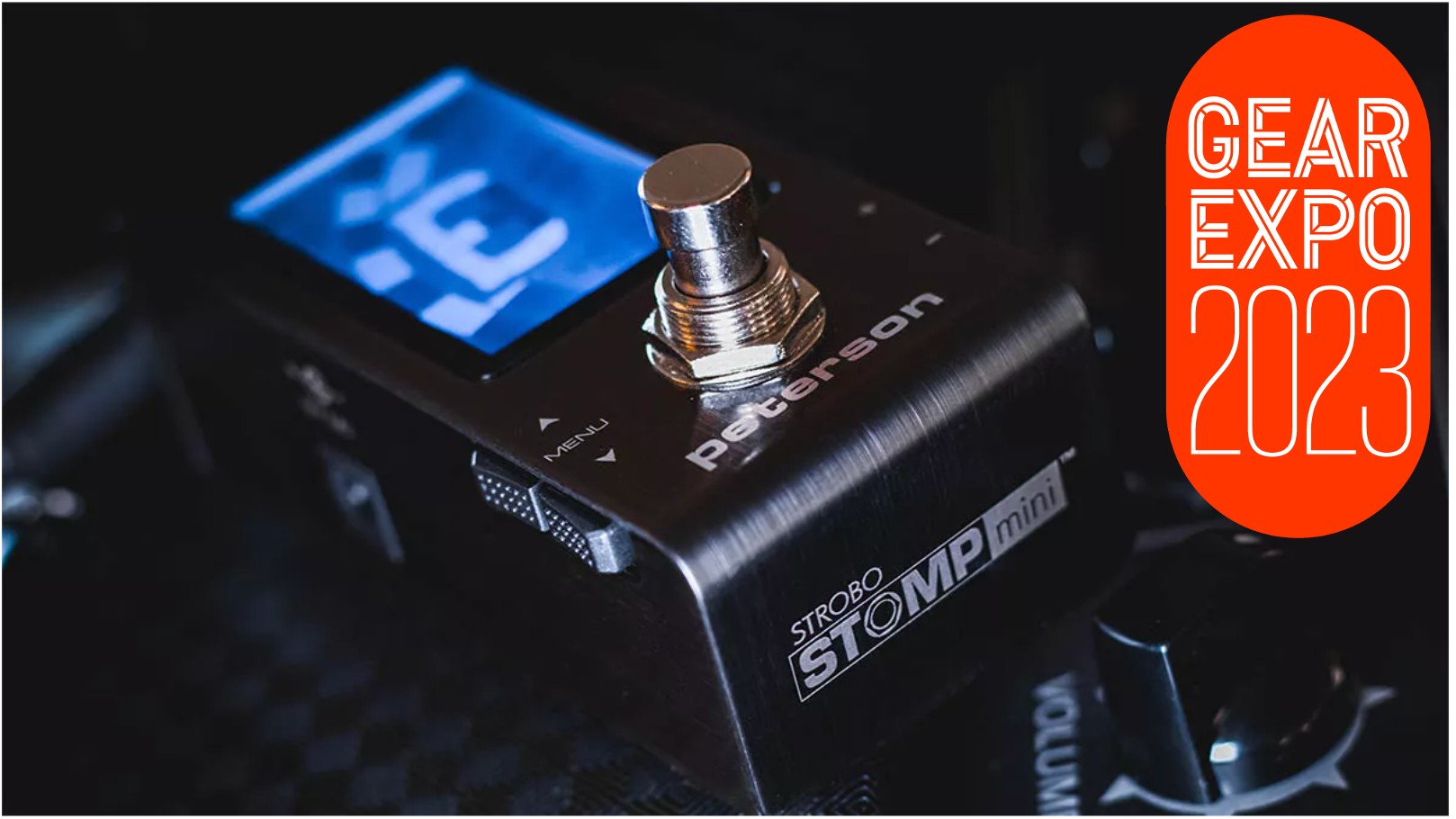
Want all the hottest music and gear news, reviews, deals, features and more, direct to your inbox? Sign up here.
You are now subscribed
Your newsletter sign-up was successful
GEAR EXPO 2023: There's a whole world of accessories that the guitarist around town shouldn't be seen without, and we have the best of them rounded up here.
On top of your guitar, your next priorities are obviously amps and effects, but there are many other optional extras out there that can make your playing and performing lives that much easier.
We've selected the best of the rest, so get ready for the phone that mods and the other mini accessories that pack in way more than they should.
Peterson StroboStomp Mini
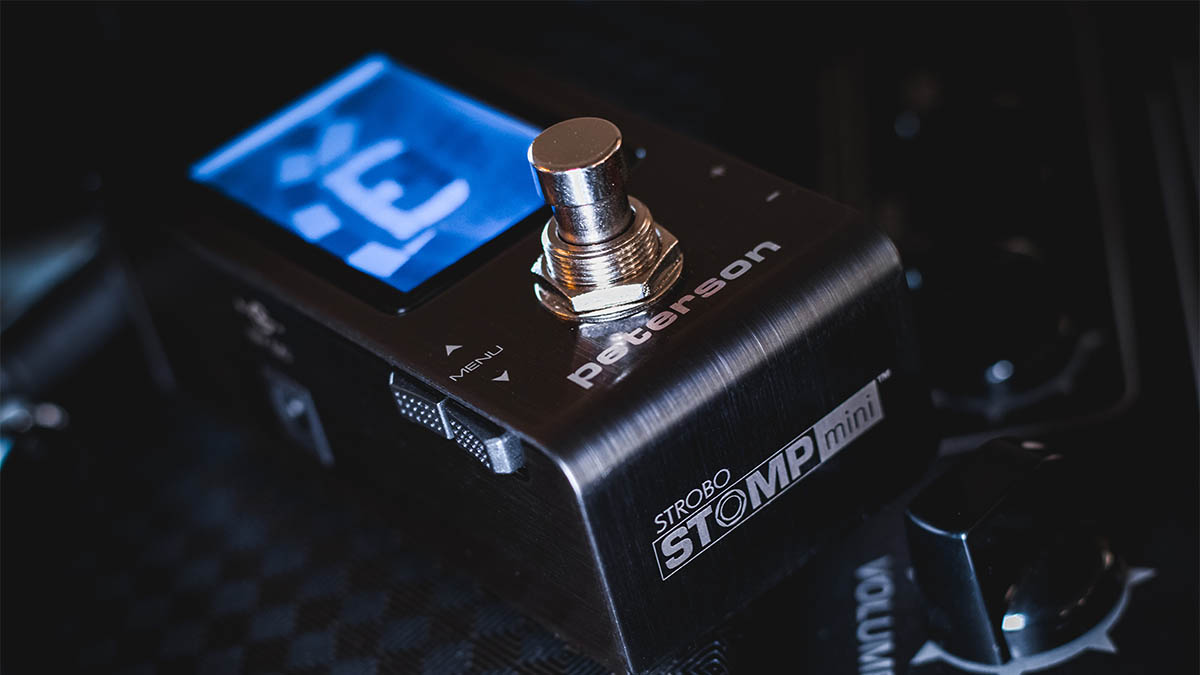
Peterson has taken one of the most popular guitar tuners on the market, the StroboStomp, and made it smaller, more pedalboard-friendly, and every bit as accurate and feature-packed as its larger sibling.
The StroboStomp Mini is dominated by a high-definition LCD display that is visible even in the most difficult lighting conditions.
It still offers users a ton of sweetened and guided tuning options - over 80 - and its strobe tuner maintains its reputation for accuracy to 0.1 cents. But the StroboStomp Mini is, by any standard, pretty tiny, weighing just 0.56lbs and measuring just 94mm x 46mm x 33.5mm (LxWxH).
Peterson has also made some improvements under the hood, with the incoming signal path in true-bypass mode now 100 per cent pop-less when you are muting the signal. It deploys a dual relay circuit that takes the incoming signal out of the game before you power the tuner down, making for a “silent transition” and for a tuner that doesn’t mess with your tone. The bypass is switchable between true and buffered.
Want all the hottest music and gear news, reviews, deals, features and more, direct to your inbox? Sign up here.
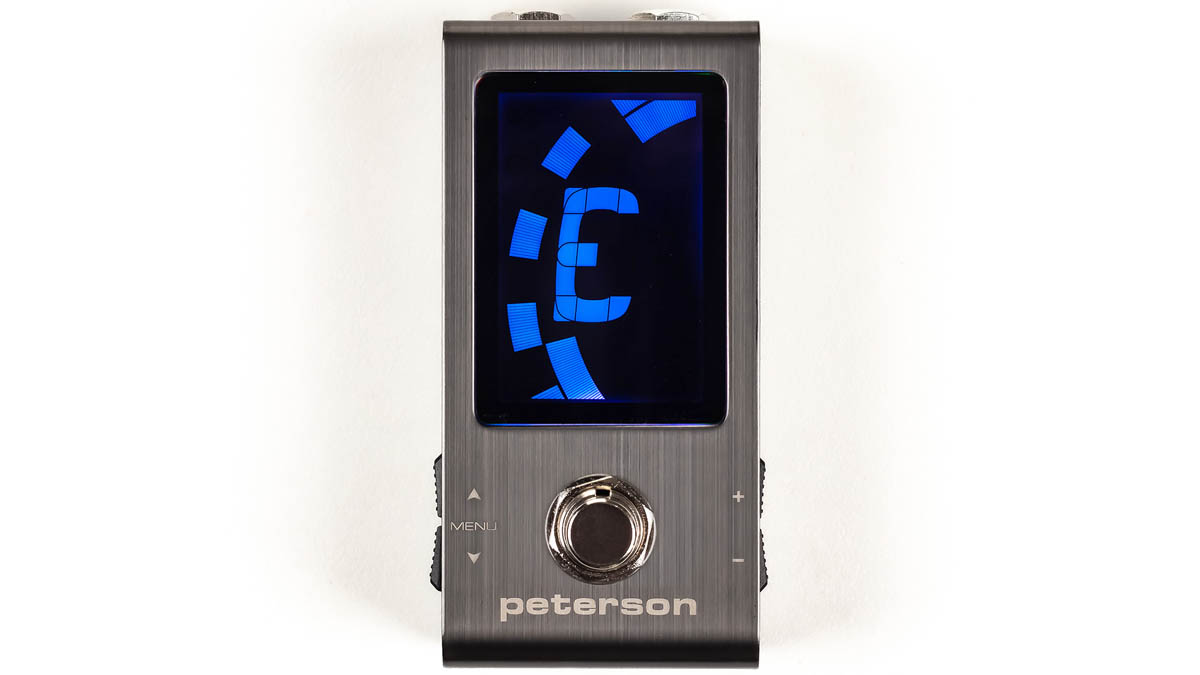
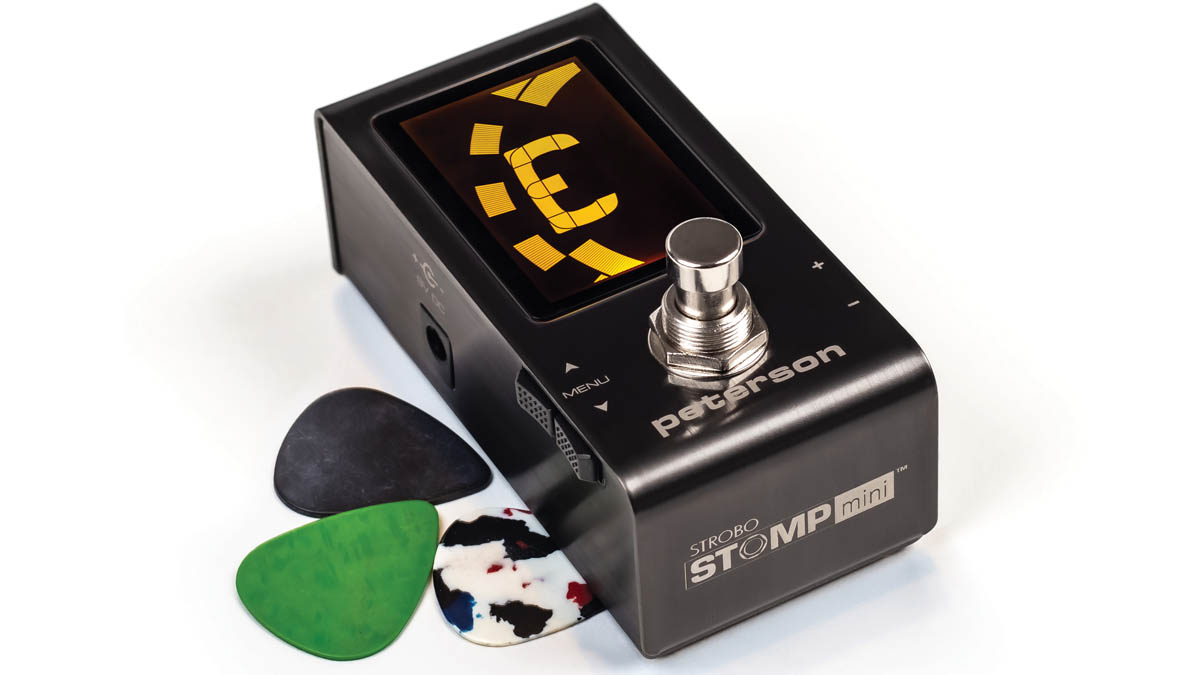
The display is user-configurable. You can change the colour from 10 presets or make your own via Peterson Connect, and these colours are not just useful from a visibility point of view but allow players to assign different colours to different tunings.
Other tech specs for the StroboStomp Mini include its 390Hz - 490Hz Concert A Reference, +5 to -6 Transposition, and it runs on a 9V DC pedalboard power supply or via USB-C bus power.
The StroboStomp Mini is a studio-quality guitar tuner. Among the sweetened tunings it offers are for acoustic guitar, 12-string guitar, 7-string guitars and guitars with True Temperament necks. Guided tunings are easy peasy, with a heap of options for drop and open tunings already dialled in on the presets.
You can access these functions via two buttons mounted on either side of the pedal. It ships in always-on monitor mode so you can get tuning feedback in real time, but you can easily set it up so it mutes when you step on the footswitch to activate the tuner.
The StroboStomp Mini is $119.99. For more details, head over to Peterson (opens in new tab).
Fender Jazzmaster and Strat Cunife / Cobalt pickups
Fender's Cunife Wide Range humbuckers had a big comeback with Fender's American Vintage II range - and in our AV II Tele Deluxe review we were frankly dazzled by them. So imagine our delight that Cunife pickups are going to be available in standard Strat and Jazzmaster sets. Plus there's a brand new Cobalt Chrome set for Teles.
And if that wasn't enough to get our guitar modding sensors tickled, Fender is also releasing its lovely Player Plus necks to buy separately.
The new Cunife pickups are the first time the magnets have been used outside of Wide Range humbuckers, themselves only returning in recent years thanks to Fender securing a factory to produced the 1979 designs. This accounts for the higher price point but based on what we heard from the latest Wide Range examples, it's worth it for those looking for something genuinely different, and very good.
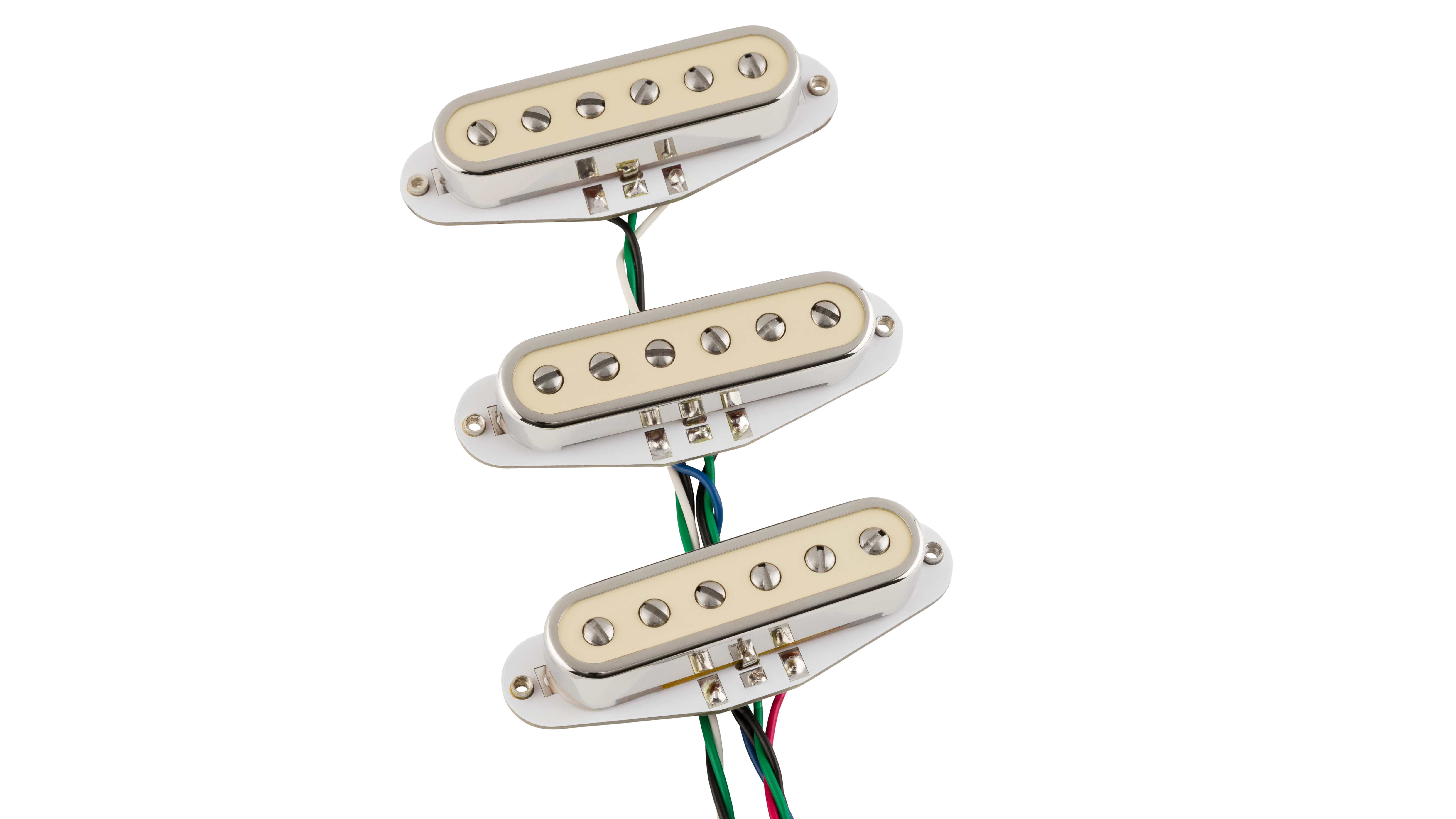
The Cunife Stratocaster Pickup Set ($349.99 USD, £319.00 GBP, €379.00 EUR, $599.00 AUD, ¥58,850JPY) is arguably Fender's boldest single-coil design since the Noiseless pickup. Fender claims they have a vintage -style voice with "deep piano-like lows, present and pleasing midrange, and sweet and sparkling highs that will invigorate your guitar playing with new life and bold dynamics".
Like the Wide Range humbuckers, these use Cunife threaded magnets with their calling cards of definition and clarity. The proposition in a single-coil Strat format has us excited and we're a little surprised we're not seeing any stock Strat models loaded with them to coincide.
The pickups' chrome-ringed covers acts as a shield to help eliminate the dreaded 60-cycle hum.
A new Tele set does not use Cunife but another new innovation to the table with Cobalt Chrome. Voiced by Fender's pickup master Tim Shaw, these pickups use Fender's blend of a FeCrCo magnet to bring "added snap" to your Tele tone. Again, chrome rings are use to help address hum.

The Cobalt Chrome Telecaster Pickup Set is $199.99 USD, £279 GBP, €329 EUR, $539 AUD, ¥41,800JPY.
For the Jazzmaster owners Fender is going bigger with two set options – recognising that its offset model is being embraced by another new generation, while still beloved by established guitar tinkerers.
There's a Cunife Wide Range set and one with a Cunife / Cobalt combo. Both will fit a standard Jazzmaster with no modifications to body of scratchplate required.
"The Wide Range Cunife Jazzmaster pickups deliver rich bell-likehumbucking tones with full bass and clear treble," says Fender. And from our experiences with Tele models, we can concur.
The Cunife Wide Range Jazzmaster Pickups ($399.99 USD, £369 GBP, €439 EUR, $739 AUD,¥58,850 JPY for a set) are also available individually.
The Cunife / Cobalt Chrome Jazzmaster Pickup Set ($299.99 USD, £279.00 GBP, €329.00 EUR, $539.00AUD, ¥41,800 JPY) mixes the Wide Range experience with an edgier bring Cobalt pickup. The best of both worlds?
Seymour Duncan HyperSwitch
As a leading manufacturer of electric guitar pickups Seymour Duncan has already got a lot of the aftermarket modding market sewn up. What more worlds are there to conquer? Well, it is now claiming to have created the "world's first Bluetooth-enabled programmable 5-way pickup selector switch".
What does that mean exactly? Apparently, Seymour Duncan HyperSwitch allows you to create custom pickup configurations on your phone and mod your guitar in real time.
Essentially, HyperSwitch connects to your smartphone via Bluetooth and allows players to play around with their pickup configuration without having to plug a soldering iron in at the wall. No mess, no fuss… No way, right?
HyperSwitch is very much a thing you can buy to turn your regular old guitar with passive pickups into something you can mod in real time, on your phone, storing presets for easy recall of your favourite sounds.
To this is basically rewiring your guitar via your phone. Say, if you wanted to wire your bridge and neck pickups together out of phase, well, as the saying goes, 'there’s an app for that', and it’ll connect with your HyperSwitch and do the necessary.
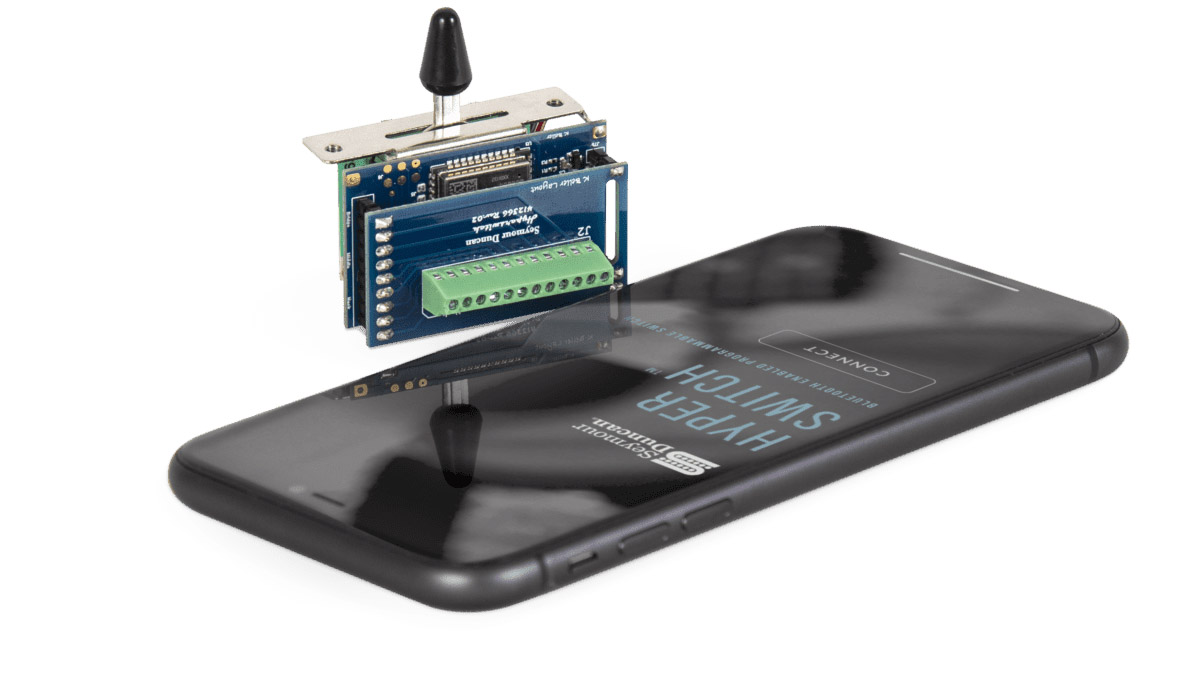
The HyperSwitch is powered by a 9V battery, is compatible with most passive pickups, and aesthetically speaking, it will suit any model that will suit a blade-style selector switch. Indeed, it doesn’t look so different from a regular passive switch, and yet it offers potentially 100s of different wiring options.
Out of phase, split-coils, parallel wiring, all are achievable and more. And your signal path remains 100 per cent analogue - the digital bit lies in how your smartphone communicates this information to the guitar.
Time will tell whether the HyperSwitch will revolutionise how we mod our guitars and think about things such as pickup selection, or whether it will go the way of the notorious Gibson Robot Guitar. But where that failed was because it was the solution to a problem that never really existed, and HyperSwitch is offering something altogether new.
It’s available now, priced £209 / $149. For more details, pop on over to (opens in new tab) Seymour Duncan. There's also another more detailed video on how to use the HyperSwitch below.
Apogee Jam X
Announced at the NAMM show this year, the Jam X will have guitarists experiencing their instruments in a whole new way, so says Apogee. The diminutive interface features a built-in compressor with three levels of gain and more tone-shaping than you should really expect from an interface of this size.
Apogee's original Jam was, can you believe it, released as long ago as 2010, but so successful that the company has released several updates and additions to the Jam line. Jam X is the latest and still manages to include something not done by its predecessors or, Apogee claims, anyone else.
Jam X squeezes an analogue compressor into its compact form which, after guitarists plug it into their iOS device or computer, will enable them to shape their tone. However, it also adds three presets – Smooth Leveler, Purple Squeeze, and Vintage Blue Stomp – to dictate how much you drive the input gain, from subtle to extreme.
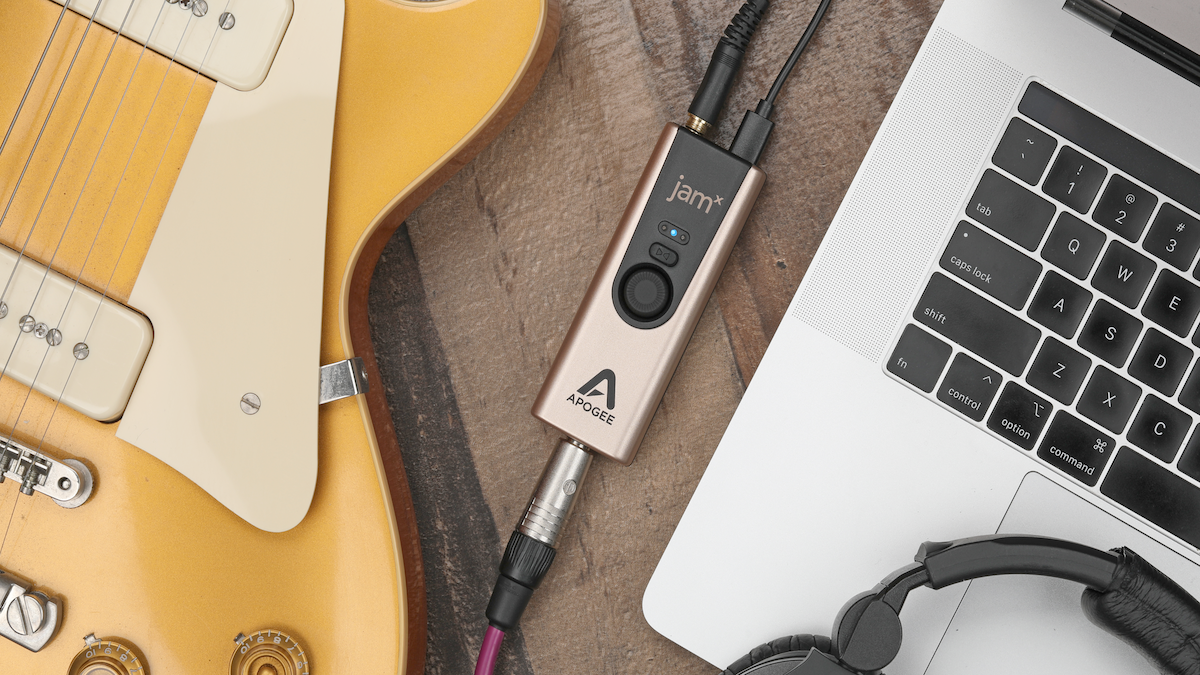
This flexibility for the input signal gives you extra shaping power over your sound before it's even reached any virtual amp sims you might be sending it too. Apogee says that with this at the front of the signal chain, guitarists will experience added sustain and dynamics, or can use Jam X to fatten up weaker source sounds.
It's a layer of extra flexibility that should make Jam X stand out from quite a crowded sector of the market - the iOS and computer interface market is certainly a bustling place to be. And other features like Blend mode, which cuts out latency when recording, plus sample rates up to 96kHz and "ample headroom" – not to mention those cool, gold looks – should keep Jam line going strong.
Jam X works with PCs, Macs and iOS devices with type C ports. And you don't have to use it just to record guitars. Plug in your bass, keyboard, synth, or any acoustic instrument with a pickup.
It retails for £/$199 and you can get more information from the Apogee (opens in new tab) website.
Looking for more great new gear? Get all our round-up, news, features, tutorials, tips and more at our Gear Expo hub page.
Andy has been writing about music production and technology for 30 years having started out on Music Technology magazine back in 1992. He has edited the magazines Future Music, Keyboard Review, MusicTech and Computer Music, which he helped launch back in 1998. He owns way too many synthesizers.


